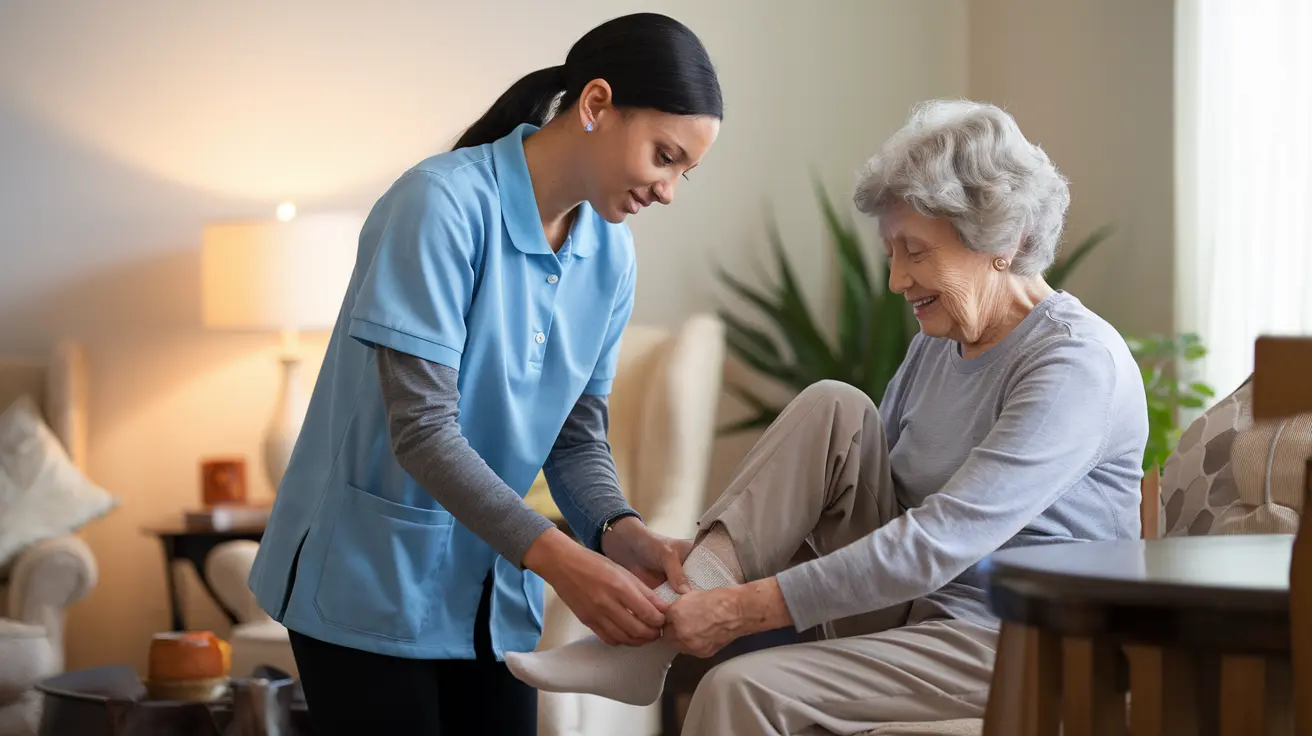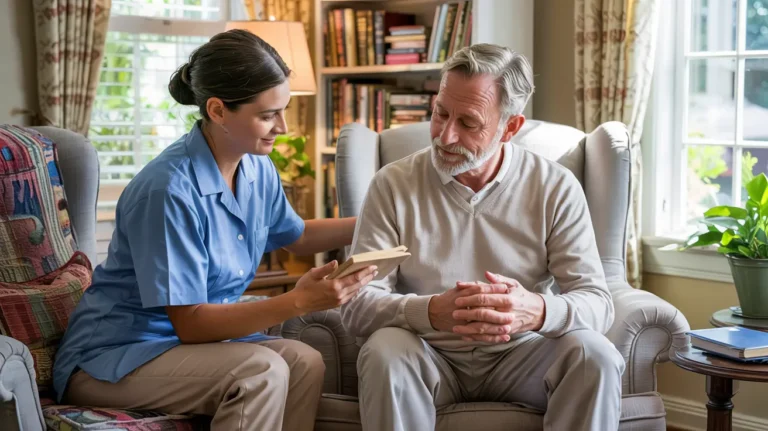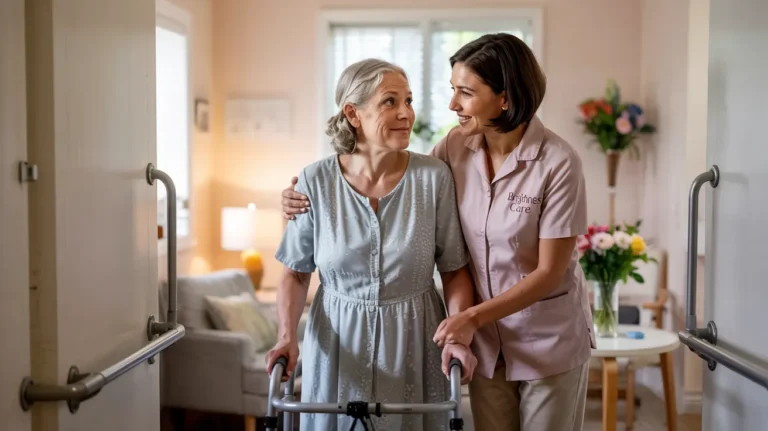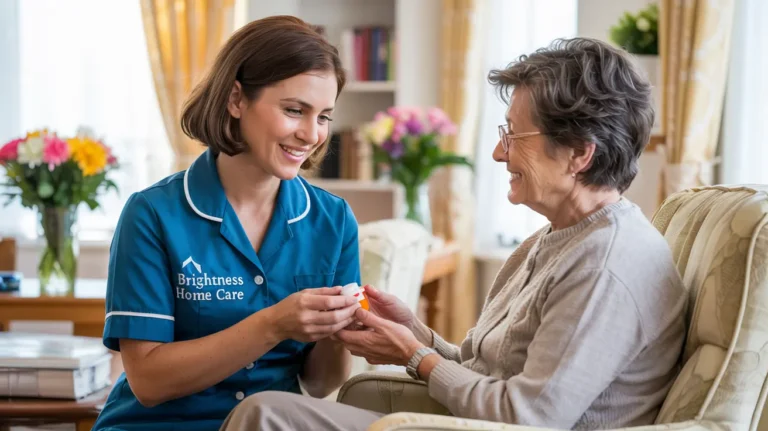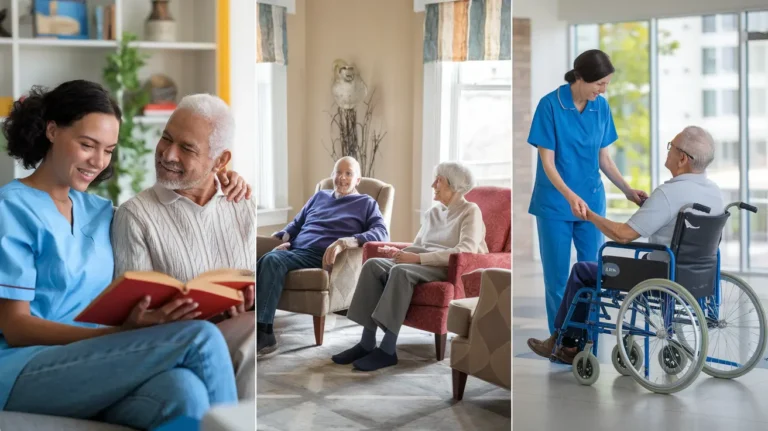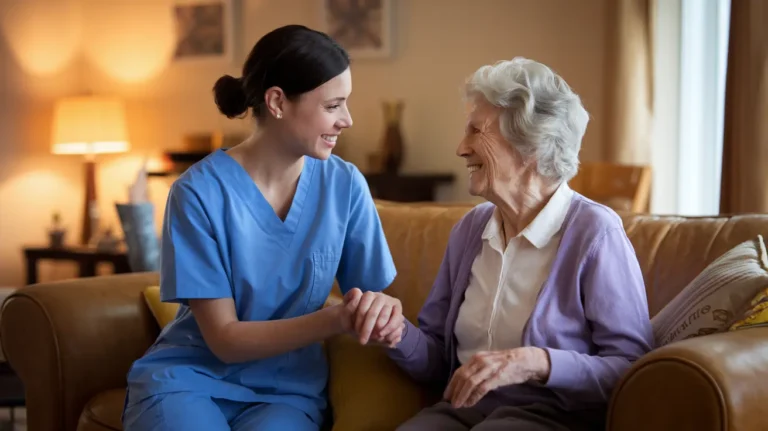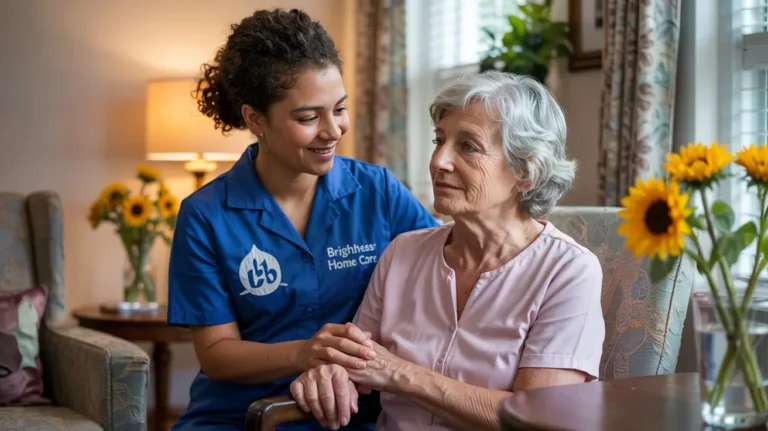The Best Daily Living Assistance Services in Indianapolis: A Complete Guide
Did you know that nearly 90% of seniors want to stay in their own homes as they age? I totally get it! There’s something about the comfort of familiar surroundings that just can’t be replaced. I remember when my own grandmother insisted on staying in her home despite needing help with daily tasks. Finding the right support was a game-changer for our family!
When it comes to daily living assistance, Indianapolis families have plenty of options, but not all services are created equal. Trust me, I’ve been through the wringer trying to figure this stuff out for my own loved ones! Whether you’re looking for help with personal care, housekeeping, or just some friendly companionship, this guide will walk you through everything you need to know about finding the best daily living assistance in the Indianapolis area.
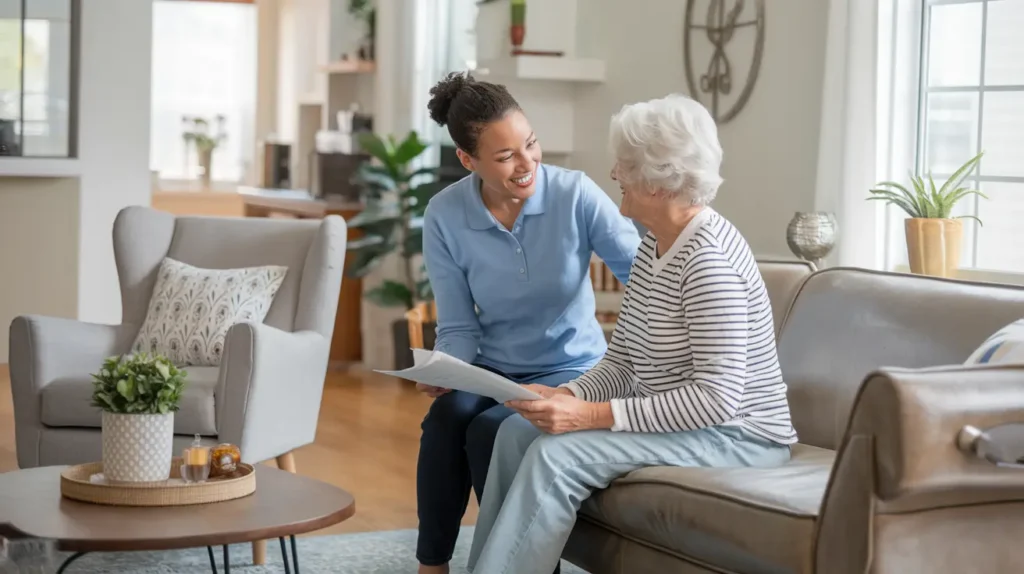
I’m especially excited to tell you about Brightness Home Care LLC, located at 4911 West 38th Street in Indianapolis. They’ve been a real beacon of hope for so many families I’ve worked with over the years! Their approach to personalized care has made them stand out in the Indianapolis community. But more on them later – let’s dive into understanding what daily living assistance actually involves!
Understanding Daily Living Assistance Services
So what exactly do we mean by “daily living assistance”? I gotta tell ya, when I first started researching options for my aunt, I was totally confused by all the industry jargon! Basically, daily living assistance covers a wide range of non-medical services designed to help folks maintain their independence while getting support with everyday tasks that have become challenging.
Daily living assistance typically includes help with what professionals call Activities of Daily Living (ADLs) and Instrumental Activities of Daily Living (IADLs). That’s a fancy way of saying both personal care tasks and household management tasks. Personal care might include bathing, dressing, and toileting, while household tasks cover things like cooking, cleaning, and running errands. The first time I watched a professional caregiver help my aunt with her morning routine, I was amazed at how they preserved her dignity while providing exactly the right level of support!
These services can be a lifesaver for so many different people. Seniors who want to age in place but need a helping hand, adults with disabilities who require assistance with certain tasks, individuals recovering from surgery or illness, and even those with cognitive impairments like dementia can all benefit tremendously. I’ve seen firsthand how the right assistance can completely transform someone’s quality of life!

One thing that confused me at first was the difference between medical and non-medical assistance. Medical home health requires skilled nursing care and is usually prescribed by a doctor after an illness or hospital stay. It’s typically short-term and focused on recovery. Non-medical assistance, on the other hand, is more about supporting everyday living and can continue indefinitely. Both are valuable services, but they serve different needs! When my uncle needed help after his hip replacement, he actually needed both types for a while.
The beauty of daily living assistance is that it’s completely customizable. No two people have exactly the same needs, and good providers understand this. Some folks might just need help with laundry and grocery shopping, while others might need more comprehensive support with bathing, dressing, and mobility. The best providers will work with you to create a care plan that addresses your specific needs and preferences.
I remember when we were setting up services for my neighbor Ruth, she was adamant about continuing to cook her own breakfast – it was her favorite part of the day! Her caregiver completely respected this and instead focused on helping with dinner prep and cleanup. That’s the kind of personalization that makes a huge difference in maintaining someone’s sense of independence and dignity!
When you’re evaluating daily living assistance options in Indianapolis, make sure to ask about their approach to customized care. Do they offer a detailed assessment process? How do they match caregivers with clients? Can services be adjusted easily as needs change? These questions will help you determine if a provider truly understands the importance of individualized support.
One aspect of daily living assistance that people sometimes overlook is the social component. Loneliness can be just as detrimental to health as physical limitations! Many older adults or individuals with disabilities find themselves increasingly isolated, which can lead to depression and declining health. Good daily living assistance includes meaningful companionship and conversation. I’ve seen remarkable improvements in people’s outlook and energy levels once they have regular social interaction with a caregiver they enjoy spending time with!
Key Benefits of Professional Daily Living Assistance
Let me tell ya, when we finally got professional help for my mom, the difference was night and day! The biggest benefit I noticed was how she maintained her independence and dignity. There’s something really powerful about being able to stay in your own home, sleep in your own bed, and keep your own routines – even when you need some help to do it safely.
Professional daily living assistance allows people to continue living life on their own terms. Instead of having to move to a facility with scheduled mealtimes and activities, individuals can maintain their preferred lifestyle with just the right amount of support. My friend’s dad was always a night owl who liked to stay up reading until 2 AM and then sleep until mid-morning. In a facility, he would’ve been forced into a completely different schedule, but with in-home assistance, he could keep his preferred routine!
The peace of mind that comes with knowing your loved one is properly cared for is honestly priceless. Before we found good help, I was constantly worried about my mom. Was she eating properly? Had she remembered her medications? Was she feeling lonely? I was checking in multiple times a day and still didn’t feel confident she was getting what she needed. The stress was affecting my work, my sleep, and my own family relationships. Having trusted professionals involved lifted a huge weight off my shoulders!
One thing I wish I’d understood sooner was how professional care can actually prevent caregiver burnout. So many of us try to do it all ourselves, but the physical and emotional toll can be enormous. I tried being my mom’s primary caregiver while working full-time and raising teenagers – let me tell you, it wasn’t sustainable! Professional caregivers provide much-needed respite and ensure that family relationships can focus on emotional connection rather than just tasks and responsibilities.
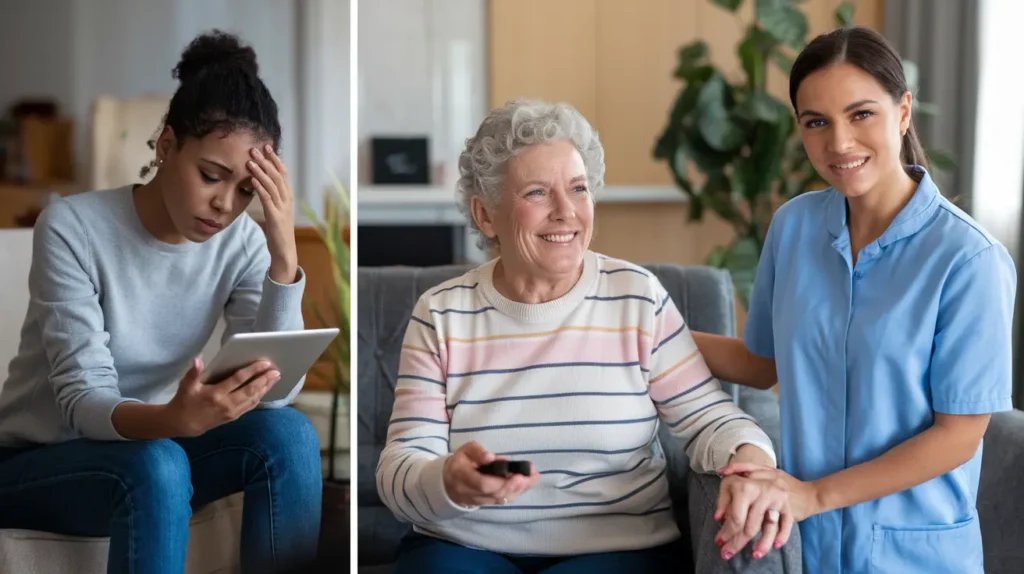
The specialized training that professional caregivers receive is another major benefit. When my uncle started showing signs of dementia, we had no idea how to handle his repetitive questions and occasional agitation. The professional caregivers had specific techniques that worked wonders! They knew exactly how to redirect him when he became fixated on something and how to keep him engaged in appropriate activities. Their training in safe transfer techniques also prevented falls, which had been a recurring problem when family members were helping him.
Something that surprises many families is that professional in-home care can actually be more cost-effective than moving to a facility, especially when 24/7 care isn’t needed. When we calculated the costs for my grandmother, we found that 4-6 hours of daily assistance was significantly less expensive than the nearby assisted living facilities – and she got to stay in her beloved home! Plus, services can be adjusted as needs change, so you’re only paying for exactly what you need.
I’ve also noticed that professional daily living assistance often leads to better health outcomes. With regular support, people are more likely to take medications correctly, eat nutritious meals, stay hydrated, and maintain better hygiene – all of which contribute to overall wellbeing. The caregivers can also spot potential health concerns early, before they become serious problems. Our caregiver noticed my aunt’s increased confusion one morning and urged us to contact her doctor, which led to the discovery of a urinary tract infection that could have become dangerous if left untreated!
For families who live far away from their loved ones, professional assistance provides crucial eyes and ears on the ground. My sister lives out of state, and knowing that there are trustworthy people checking in on our dad regularly gives her tremendous comfort. The caregivers keep us updated on any concerns and ensure that dad isn’t trying to hide problems (which he totally would do if left to his own devices)!
Essential Daily Living Assistance Services in Indianapolis
When I first started exploring daily living assistance options in Indianapolis, I was amazed at the range of services available! Personal hygiene and grooming assistance is often one of the most important services, though it can be the hardest for people to accept help with initially. I remember how resistant my uncle was to having help with bathing – it felt like such an invasion of privacy to him. But a skilled caregiver from Brightness Home Care approached the situation with such respect and professionalism that he eventually became comfortable with the assistance.

Good hygiene assistance includes help with bathing, showering, oral care, hair care, and other grooming tasks. The best caregivers know how to provide just the right level of support – encouraging independence where possible while ensuring safety and thoroughness. They also understand the importance of preserving dignity throughout these very personal interactions. I’ve seen caregivers who can make even potentially embarrassing situations feel completely normal and respectful!
Meal preparation is another crucial service that makes a huge difference in quality of life and health outcomes. When my neighbor started struggling with cooking, she began relying on frozen dinners and snacks – definitely not ideal for her diabetes! Her caregiver now prepares nutritious meals that comply with her dietary restrictions while still honoring her taste preferences. The caregiver even incorporated some of her favorite family recipes, which brought her so much joy!
Good meal preparation services should include menu planning, grocery shopping, cooking, serving, and cleanup. Caregivers should be knowledgeable about common dietary restrictions and nutritional needs for seniors or individuals with specific health conditions. The best services will also monitor food intake and hydration, which can be particular concerns for older adults who may have diminished senses of hunger and thirst.
Medication reminders and management are absolutely essential services that help prevent dangerous mistakes. My dad was prescribed multiple medications following his heart surgery, and keeping track of what needed to be taken when was incredibly confusing! His caregiver organized everything in a weekly pill organizer and provided timely reminders, ensuring he stayed on track with his medication regimen. For clients who need it, caregivers can also provide medication administration, though this typically requires specialized training.
Light housekeeping and laundry might not seem as critical as personal care, but a clean, orderly living environment has a significant impact on both physical safety and emotional wellbeing. Reducing clutter prevents falls, regular cleaning minimizes allergens and germs, and fresh linens and clean clothes support good hygiene and dignity. I noticed my aunt’s mood improved dramatically once her home was consistently clean and organized – the chaos had been adding to her anxiety!
Transportation and errand assistance is another service that can be absolutely transformative. Losing the ability to drive can be devastating to one’s independence. When my friend’s mother had to give up her car keys due to vision problems, she became increasingly isolated and depressed. Having a caregiver who could take her to doctor’s appointments, shopping trips, and social events gave her back a sense of connection to her community. Many daily living assistance providers in Indianapolis offer transportation services, though it’s important to verify that caregivers are properly insured for this purpose.
Brightness Home Care LLC in Indianapolis offers specialized services that go beyond these basics, including dementia and Alzheimer’s care, post-hospitalization care, and end-of-life support. Their caregivers receive additional training in these areas to address the unique challenges they present. When my colleague’s mother was diagnosed with early-stage Alzheimer’s, the specialized memory care techniques used by her caregiver helped minimize confusion and agitation while maximizing her remaining abilities.
What I’ve learned through helping several family members is that the best daily living assistance services are those that can adapt to changing needs over time. Someone might start with just needing help with housekeeping and transportation but eventually require more personal care assistance. Working with a provider that offers a comprehensive range of services means you won’t have to switch companies as needs evolve. Brightness Home Care’s flexible service model has been particularly valuable for families I know who’ve been on this journey.
What Makes Brightness Home Care LLC Stand Out
In my years of researching care options in Indianapolis, Brightness Home Care LLC has consistently impressed me with their commitment to excellence. Located conveniently at 4911 West 38th Street in Indianapolis, they’ve established themselves as a trusted provider with deep roots in the community. Their mission centers around enhancing quality of life while enabling independence – a philosophy I’ve seen them put into practice time and again.
The company was founded after the owner experienced firsthand the challenges of finding quality care for a family member. This personal connection to their mission really shows in how they operate! They weren’t just looking to start a business; they wanted to address gaps they’d seen in the care industry. That passion for improvement drives everything they do, from caregiver training to care coordination.
Speaking of caregivers – the qualification and training standards at Brightness Home Care are seriously top-notch! All their caregivers undergo extensive background checks, possess relevant certifications, and receive ongoing education in specialized care techniques. What really sets them apart, though, is how they go beyond technical skills to emphasize compassion, communication, and cultural sensitivity. I was blown away by how thoughtfully they matched my colleague’s mother with a caregiver who shared her cultural background and could prepare familiar foods that brought her comfort!
Their personalized care planning process is remarkably thorough. Rather than offering cookie-cutter packages, they conduct comprehensive assessments to understand each client’s unique needs, preferences, routines, and goals. The care coordinator who came to assess my neighbor asked questions I wouldn’t have even thought to consider – everything from sleep patterns to food preferences to emotional triggers. They then developed a detailed care plan that addressed each area of need while respecting his desire for maximum independence.
Brightness offers an impressive range of specialized services that address diverse needs. Beyond standard daily living assistance, they provide specialized dementia care, post-surgical recovery support, respite care for family caregivers, and palliative care services. Their caregivers receive additional training in these specialized areas, which makes a huge difference in the quality of care. When my uncle was recovering from knee replacement surgery, his caregiver knew exactly how to assist with his prescribed exercises and recognized warning signs that helped prevent complications.
What really convinced me about their quality was hearing directly from clients and their families. The testimonials consistently highlight how Brightness caregivers go above and beyond, treating clients like family rather than just assignments. One woman told me how her mother’s caregiver noticed her love of gardening and brought in small potted plants they could tend together indoors when outdoor gardening became too difficult. These thoughtful touches make all the difference in quality of life!
I’ve also been impressed by their responsiveness when issues arise. No service is perfect 100% of the time, but what matters is how companies handle problems. When my friend had concerns about scheduling consistency, Brightness addressed the issue immediately and implemented a better communication system to prevent future problems. Their willingness to listen and adapt demonstrated a genuine commitment to client satisfaction.
The company’s approach to communication deserves special mention. They use a combination of traditional methods and technology to keep family members informed about their loved one’s care. Regular updates, secure messaging systems, and detailed care logs ensure that everyone stays on the same page. As someone who coordinates care for a family member while working full-time, I really appreciate being able to check in virtually and receive prompt responses to any questions or concerns!
Brightness Home Care also stands out for their involvement in the broader Indianapolis community. They participate in senior health fairs, offer educational workshops on aging-related topics, and collaborate with other service providers to ensure comprehensive support. This community-centered approach reflects their understanding that good care extends beyond the hours a caregiver spends in the home.
How to Choose the Right Daily Living Assistance Provider
Choosing the right daily living assistance provider is one of the most important decisions you’ll make for yourself or your loved one. Trust me, I learned this the hard way! Before finding a great match, we went through two providers that just weren’t the right fit for my dad’s needs. To save you that hassle, I’ve put together some crucial questions to ask potential providers.
First, ask detailed questions about their caregivers’ qualifications and training. What specific certifications do they require? How thorough are their background checks? What ongoing training do caregivers receive? The answers will tell you a lot about the quality of care you can expect. When I interviewed Brightness Home Care, I was impressed by their comprehensive screening process and regular skills evaluations for all staff members.

Don’t be shy about asking how they handle caregiver matching and what happens if the match isn’t working out. A good provider should have a thoughtful process for pairing caregivers with clients based on needs, personality, and preferences – not just whoever happens to be available! They should also have a straightforward procedure for requesting a different caregiver if needed. Remember, this person will be in your or your loved one’s home, so compatibility matters tremendously!
Another critical area to investigate is supervision and quality assurance. How often do supervisors check in? What kind of oversight ensures care plans are being followed correctly? Do they conduct regular client satisfaction surveys? Companies with robust quality monitoring typically provide more consistent care. I appreciate that Brightness Home Care conducts regular unannounced supervisor visits and follows up with clients directly to ensure satisfaction.
Be sure to ask about their hiring practices and caregiver retention rates. High turnover often indicates problems with the company culture or management and can lead to inconsistent care. Companies that treat their caregivers well typically deliver better service to clients! Ask how long their average caregiver has been with the company and what they do to promote staff satisfaction and development.
Now, let me warn you about some red flags to watch out for! Be wary of providers that can’t clearly explain their pricing structure or have lots of hidden fees. A reputable company will provide detailed information about costs and billing practices upfront. Also be cautious about companies that promise immediate placement without a thorough assessment – proper care planning takes time!
Another warning sign is reluctance to provide references. Good providers should be happy to connect you with current or former clients who can speak to their experience. I always recommend talking to at least two references before making a decision. Also, check online reviews, but remember to look for patterns rather than focusing on a single negative comment.
Understanding pricing and payment options is crucial but can be confusing. Most daily living assistance is paid privately, though some long-term care insurance policies may cover certain services. Some providers also accept Medicaid waiver programs for eligible clients. Be sure to ask about minimum hour requirements, cancellation policies, and whether there are different rates for different types of care or times of day.
When evaluating potential caregivers, look beyond technical qualifications to assess “soft skills” like empathy, patience, and communication ability. The technical aspects of care are important, but the relationship quality often has an even bigger impact on satisfaction. During our search, we met one caregiver who looked great on paper but just didn’t connect well with my mother. The right personality fit makes all the difference!
Flexibility and communication are non-negotiable qualities in a good provider. Care needs often change, sometimes suddenly, and you need a company that can adapt quickly. Ask about their policy for adjusting services, their response time for urgent requests, and how they handle communication with family members. Brightness Home Care uses a secure family portal that allows authorized family members to view care notes and updates, which has been incredibly helpful for our family since we don’t all live nearby.
Don’t underestimate the importance of company values and philosophy. Ask providers about their approach to care and what principles guide their work. Their answers will tell you whether they view caregiving as merely a business transaction or as a meaningful human service. The most satisfying care relationships occur when the provider’s values align with your own expectations about respect, dignity, and quality of life.
Getting Started with Daily Living Assistance Services
I remember feeling completely overwhelmed when we first decided to get daily living assistance for my father-in-law. Where do we even begin? What I’ve learned through that experience (and helping several friends navigate the same process) is that a systematic approach makes everything much more manageable.
The process typically begins with a comprehensive assessment. A care coordinator will visit the home to evaluate needs, discuss preferences, and observe the living environment. Don’t be surprised if this assessment is quite detailed! They’ll ask about medical conditions, mobility issues, cognitive status, daily routines, favorite activities, and more. I was actually impressed by how thorough the Brightness Home Care assessment was – they even asked about my dad’s preferred wake-up time and bedtime rituals!
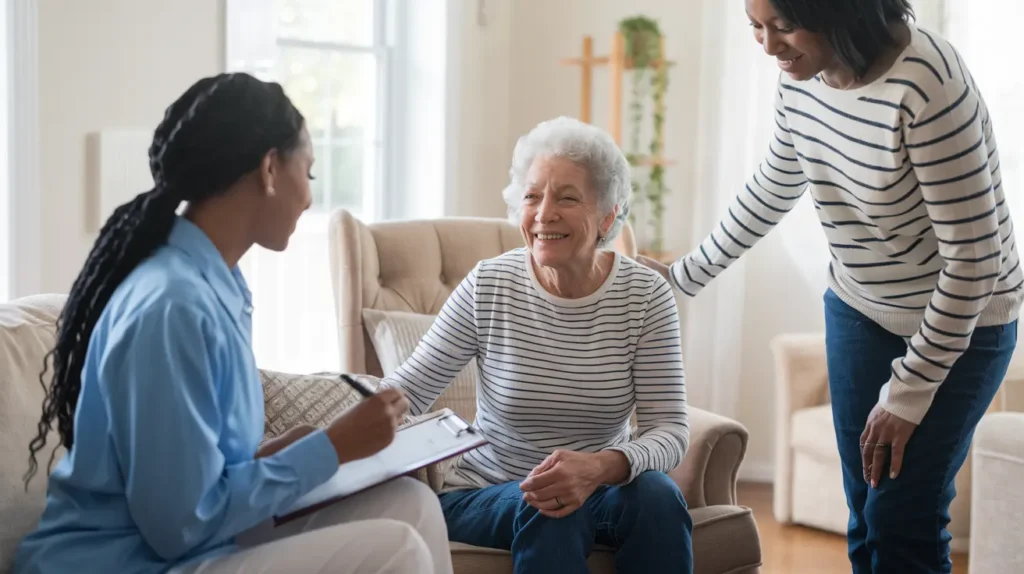
Be prepared to share medical information during this assessment. While daily living assistance is non-medical, understanding health conditions helps caregivers provide appropriate support. For example, a client with diabetes might need special attention to meal timing and foot care, while someone with dementia might need specific communication approaches. Bringing a list of medications, allergies, and doctor contacts to this meeting is super helpful!
Setting up a schedule that works for everyone is the next step. Most providers offer flexible scheduling options, from a few hours a week to 24/7 care. Be honest about your needs and budget constraints. Sometimes families start with limited hours and increase gradually as trust develops or needs change. When we started with care for my aunt, we began with just three afternoons a week and eventually increased to daily visits as she became more comfortable with having assistance.
The caregiver introduction is a crucial moment in establishing a successful care relationship. Good providers will arrange a meet-and-greet before care officially begins. This gives everyone a chance to get acquainted in a low-pressure situation. I recommend preparing a few questions and conversation starters to break the ice. When we met my mom’s new caregiver, I made sure to point out mom’s family photos as conversation starters, which helped them connect right away over shared experiences.
During the initial care period, expect some adjustment time as caregivers learn preferences and routines. Don’t hesitate to provide feedback during this phase! Most issues can be easily resolved with clear communication. For example, we noticed that my father-in-law seemed more agitated on days when his caregiver arrived while he was still having his morning coffee. When we mentioned this, the agency adjusted the schedule by 30 minutes, which made a world of difference in how the day began!
Remember that services can and should be adjusted as needs change. The care plan isn’t set in stone! Regular reassessments help ensure that the care provided remains appropriate. Most quality providers like Brightness Home Care will conduct formal reassessments every few months, but you can request a care plan review anytime circumstances change. After my neighbor’s minor stroke, Brightness quickly reevaluated her needs and adjusted services to include additional physical support and medication management.
One aspect that families sometimes overlook is the importance of setting up good communication systems from the beginning. Decide who will be the primary family contact for the agency, how updates will be shared among family members, and how emergency situations will be handled. Some families create group texts or email threads, while others use care management apps to keep everyone informed. Finding a system that works for your situation prevents miscommunication and ensures everyone stays in the loop.
Don’t forget about additional resources that might complement daily living assistance. Depending on needs, you might benefit from home modifications, medical alert systems, meal delivery services, or specialized equipment. Ask your care provider for recommendations – they often have partnerships with other service providers and can help coordinate comprehensive support. When we got care set up for my uncle, the agency connected us with a great handyman who installed grab bars in the bathroom and a ramp at the front entrance, making the home much safer.
Finally, remember that adjusting to having in-home care is a significant transition that might stir up complex emotions for everyone involved. The person receiving care might feel a loss of independence or privacy. Family members might experience relief mixed with guilt. These feelings are completely normal! Give yourself and your loved ones grace during this adjustment period. In my experience, once good relationships are established with caregivers and routines become familiar, most people wonder how they ever managed without the support.
Brightness Home Care LLC stands out in Indianapolis for their thoughtful approach to this transition period. Their care coordinators check in frequently during the first few weeks to address any concerns promptly, and they’re always available to answer questions or make adjustments. This attentiveness during the critical initial phase helps establish trust and comfort for everyone involved.
Conclusion
Navigating the world of daily living assistance can feel overwhelming at first, but finding the right support makes all the difference in maintaining independence, dignity, and quality of life! Throughout this guide, we’ve explored the various types of services available, the benefits of professional assistance, and the key factors to consider when choosing a provider in Indianapolis.
I’ve seen firsthand how the right daily living assistance can transform lives – helping seniors age gracefully in their own homes, supporting adults with disabilities to live more independently, and giving family caregivers much-needed relief and peace of mind. The key is finding services that are truly personalized to meet individual needs and preferences.
Brightness Home Care LLC at 4911 West 38th Street in Indianapolis stands out for their commitment to compassionate, personalized care. Their comprehensive assessment process, well-trained caregivers, and flexible service options make them an excellent choice for families seeking daily living assistance in the Indianapolis area. I’ve been consistently impressed by their attention to detail and genuine concern for their clients’ wellbeing!
Remember that getting started with daily living assistance doesn’t mean giving up independence – quite the opposite! The right support enables people to continue living life on their own terms, with enhanced safety and comfort. Whether you’re looking for a few hours of weekly assistance or more comprehensive daily support, services can be tailored to fit your specific situation.

I encourage you to reach out to Brightness Home Care LLC for more personalized information about how they can support you or your loved one. Their care coordinators are happy to answer questions, provide detailed information about services, and guide you through the process of getting started. Don’t wait until a crisis forces your hand – proactive planning leads to better outcomes and more choices!
Ready to take the next step toward enhanced independence and quality of life? Contact Brightness Home Care LLC today to schedule a no-obligation consultation and home assessment. Their caring team is ready to help you navigate this important decision with confidence and peace of mind!

